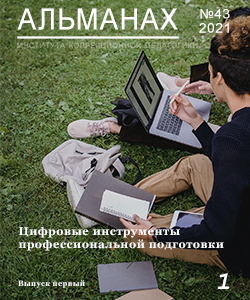Digitital training tools
Almanac #43 · Issue #1 · 2021

Digital instruments in professional teacher training
Modern digital technologies play a double role in the teacher training system. On the one hand, the use of digital tools can affect the effectiveness of such training. On the other hand, the quality of work of future teachers largely depends on the level of mastering the techniques of subsequent professional activity in the context of using digital technologies. The article discusses the problems and possible prospects for the integrated use of digital tools in both cases, when they act as an object for study and a means of teaching in the preparation of students of pedagogical specialties of universities. The need to find approaches to the interconnected and justified application of digital technologies is emphasized. The article substantiates the mutual influence of the quality of educational e-resources and the effectiveness of complex informatization of pedagogical education.
Keywords
Digital instruments in professional teacher training
digital toolsdigital technologies
teacher training
teaching means
informatization of education
e-resources
digital educational environment
Digital tools for the formation of professional skills of special teachers
The article presents the types and functions of digital tools for professional training of special teachers: interactive educational maps of ontogenesis, electronic libraries of children's and family cases, virtual professional practices/simulators, simulators of professional activity of special teacher.
Keywords
Digital tools for the formation of professional skills of special teachers
professional trainingspecial teacher
speech therapist
professional activity
virtual reality
virtual professional practices
virtual simulators of professional activity
electronic libraries of children's cases
interactive educational maps
ontogenesis
The effectiveness of virtual practice for diagnosis of speech diserders
,
The article is devoted to the development and application of virtual professional speech therapist simulators, to the assessment of their effectiveness. The developed virtual practice of diagnosing phonetic disorders using forty-six (46) children's cases is described. The methodology of its design, structural and functional organization, types of professional exercises, principles of selection and complication of children's cases, methods of feedback are disclosed. The high efficiency of using virtual diagnostic practices in the professional training of a speech therapist is shown.
Keywords
The effectiveness of virtual practice for diagnosis of speech diserders
virtual professional simulatorspeech therapy
professional competence
digital instruments
Interactive educational model of speech therapy examination: forming a working hypothesis
,
The article presents the problem of simulating the professional activity of a speech therapist to form a student's readiness to apply the theory in practical work with children before and without direct contact with them. The interactive model of the initial stage of the professional activity of a speech therapist is considered. It makes possible to reproduce, analyze and comment on all the steps in the process of forming a hypothesis of speech impairment, including not available for direct observation in real practice, on a set of cases-study.
Keywords
Interactive educational model of speech therapy examination: forming a working hypothesis
virtual simulatorsdiagnostics
stuttering
From digital tools for assessing the child development to digital tools for professional training of defectologists
Variants of ideas about the world (A, B, C, D) of preschoolers with normative development, learning disabilities, speech and hearing impairments were revealed. The pedagogical design of the architecture of the e-library of the corresponding children's cases for students is presented. Such e-library illustrating the need to focus on the individual variant of the child's development for determine the tasks and content of special assistance.
Keywords
From digital tools for assessing the child development to digital tools for professional training of defectologists
children with normative developmentdeaf children
hearing impaired children
children with speech impairments
children with learning disabilities
e-library
preschool education
world views
The effectiveness of digital tools for the formation of general cultural and professional competencies
The article shows the effectiveness of interactive educational model, which helps the students to discover the link of the socio-cultural environment and the special and inclusive education practice in different countries.
Keywords
The effectiveness of digital tools for the formation of general cultural and professional competencies
interactive teaching modelsprofessional training
defectologist
socio-cultural foundations
special education
inclusive education
What architecture of digital libraries does a modern audience need in terms of distance learning?
The article presents the characteristics of the modern network audience of special psychology and pedagogy and the changes it requires in the architecture of electronic catalogs and libraries of professional literature.
A new way of professionally oriented structured description of semantics electronic catalog of special psychology and pedagogy publications is proposed and substantiated.
Keywords
What architecture of digital libraries does a modern audience need in terms of distance learning?
special psychologyspecial pedagogy
inclusive education
electronic catalog
design of e-libraries
professionally oriented search